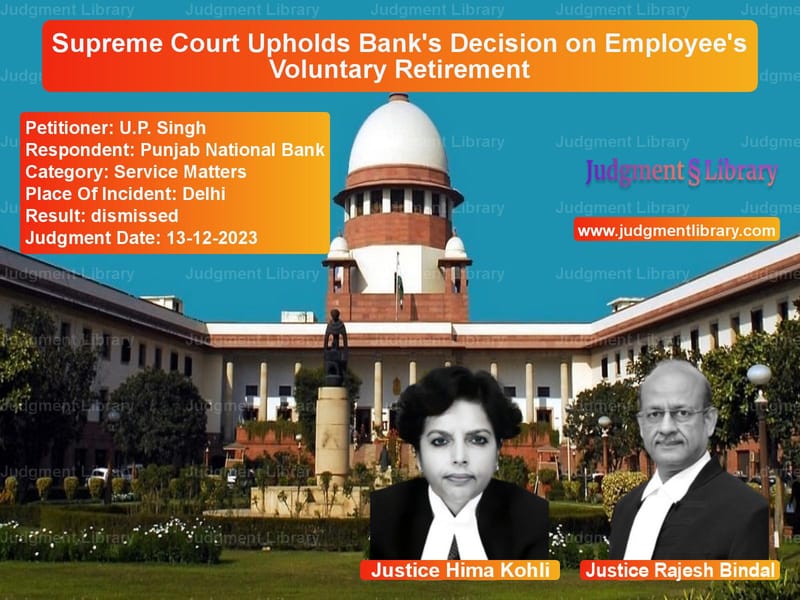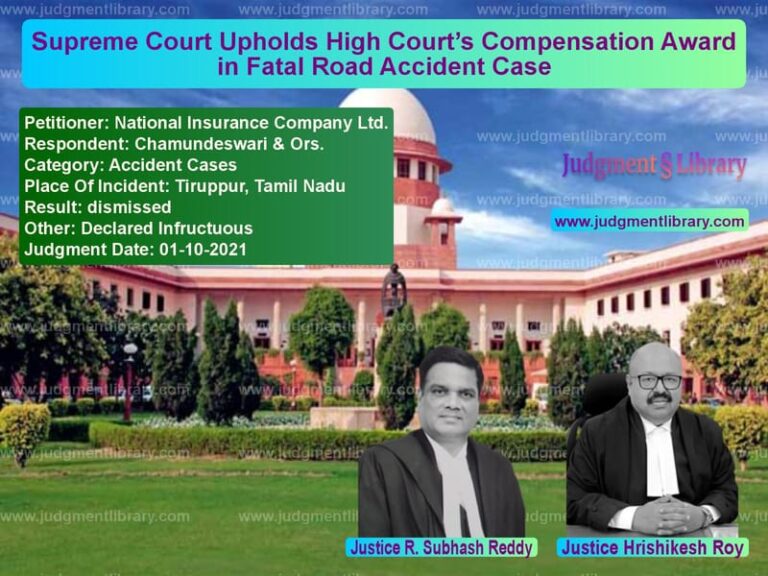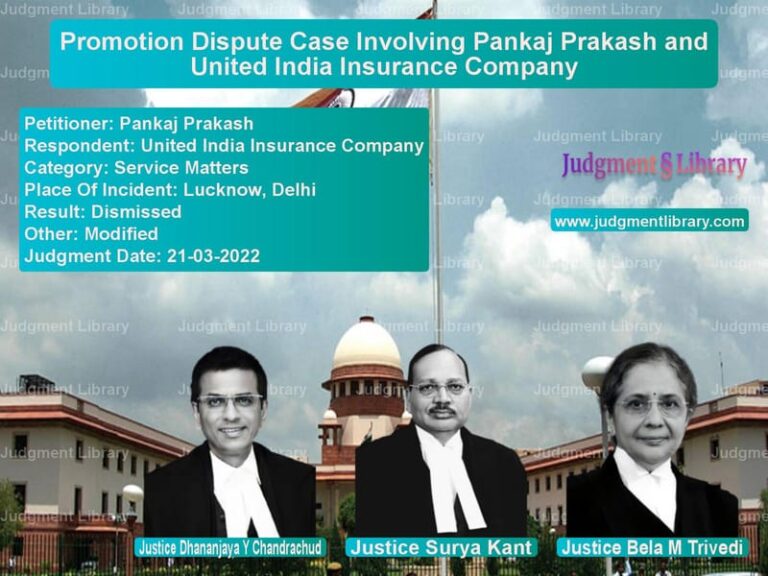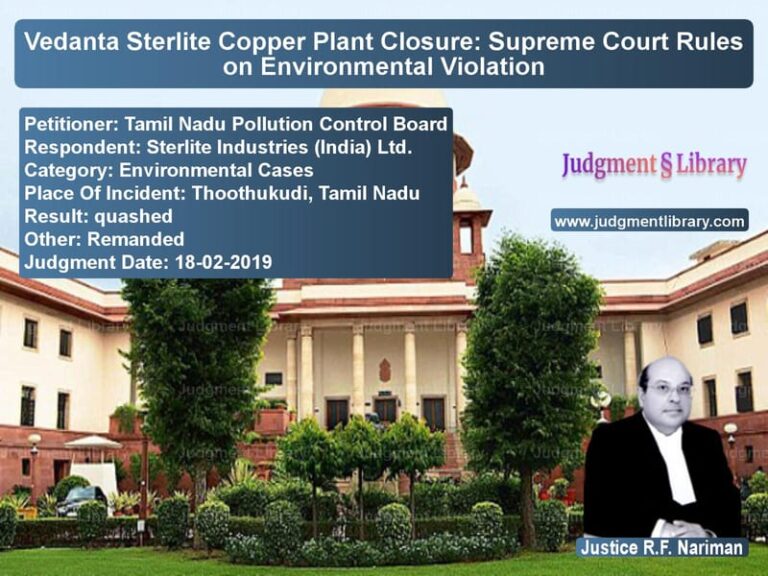Supreme Court Upholds Bank’s Decision on Employee’s Voluntary Retirement
The Supreme Court recently ruled in the case of U.P. Singh v. Punjab National Bank, addressing the issue of voluntary retirement under the Bipartite Agreement in the banking sector. The ruling clarified an employer’s right to enforce deemed voluntary retirement when an employee remains absent without leave for an extended period.
Background of the Case
The dispute originated when the appellant, U.P. Singh, a bank employee, was deemed to have voluntarily retired from Punjab National Bank (PNB) on December 5, 1984, due to continued absence from duty. The appellant, dissatisfied with this decision, challenged the action, leading to prolonged litigation.
The case involved multiple legal proceedings:
- The Central Government Industrial Tribunal ruled in favor of the employee, ordering his reinstatement with back wages.
- The Delhi High Court, in both Single Judge and Division Bench orders, overturned the Tribunal’s ruling.
- The appellant then moved the Supreme Court, challenging the High Court’s decision.
Legal Issues Raised
- Did the bank legally invoke Clause XVI of the Bipartite Agreement to deem the employee as voluntarily retired?
- Was the appellant’s prolonged absence justified?
- Did the bank violate principles of natural justice?
Arguments of the Appellant (U.P. Singh)
- The bank’s decision to deem him voluntarily retired was illegal.
- He was placed under suspension and was not given sufficient opportunity to rejoin duty.
- The transfer order issued after his suspension was not legitimate.
- The bank did not pay him subsistence allowance, making it impossible for him to report for duty.
- He had been actively demanding reinstatement and had even gone on a hunger strike to protest against the bank’s actions.
Arguments of the Respondent (Punjab National Bank)
- The employee was a habitual troublemaker who repeatedly defied orders and misbehaved with senior officials.
- Despite multiple notices and extensions, he failed to report to his designated posting.
- Clause XVI of the Bipartite Agreement provided clear guidelines for voluntary cessation of employment when an employee remained absent for 90 consecutive days without valid justification.
- The employee was given multiple opportunities to join duty, including a final notice, which he ignored.
Supreme Court’s Observations
1. Voluntary Cessation of Employment is Legally Valid
The Court upheld the bank’s decision under Clause XVI of the Bipartite Agreement, stating:
“An employer has the right to deem an employee as voluntarily retired if he fails to join duty within the prescribed period despite repeated notices.”
2. Absence Without Leave is Grounds for Termination
The Court noted that the appellant had remained absent for an extended period without formal approval:
“An employee cannot sit at home and decide on his own that an order is illegal. If he had grievances, he should have sought legal remedies instead of remaining absent.”
3. No Violation of Natural Justice
The Court ruled that the bank had given sufficient opportunities to the employee to rejoin:
“Repeated notices were sent, and even a public notice was issued when the employee refused to disclose his address. The bank followed due process.”
4. Employee’s Conduct Showed Lack of Interest in Rejoining
The Court took note of the fact that the appellant had started practicing as a lawyer soon after leaving the bank:
“The appellant enrolled as an advocate in 1985 and has been actively practicing law, which clearly indicates that he had no intention of resuming his job.”
Final Judgment
- The Supreme Court dismissed the appeal.
- The ruling of the Delhi High Court was upheld.
- The employee’s voluntary retirement under the Bipartite Agreement was deemed legal.
Key Takeaways
1. Employers Have the Right to Enforce Voluntary Retirement in Case of Absenteeism
The judgment clarifies that banks and other institutions can invoke voluntary cessation clauses if an employee remains absent beyond the permissible period.
2. Ignoring Transfer Orders is Not a Valid Defense
The Court emphasized that employees must comply with transfer orders and seek legal remedies if they wish to challenge them, rather than refusing to report.
3. Prolonged Absence Without Justification Can Lead to Termination
Absence for 90 consecutive days without approval allows an employer to take action as per employment agreements.
4. Natural Justice is Satisfied If Repeated Notices Are Issued
Employers must issue multiple notices before enforcing voluntary retirement, as was done in this case.
Conclusion
This Supreme Court ruling sets a precedent for employment disputes involving prolonged absenteeism. It reinforces that employers can take legitimate action against employees who fail to report for duty despite multiple warnings. The judgment serves as a cautionary tale for employees to follow due process when challenging employment decisions rather than resorting to indefinite absenteeism.
Petitioner Name: U.P. Singh.Respondent Name: Punjab National Bank.Judgment By: Justice Hima Kohli, Justice Rajesh Bindal.Place Of Incident: Delhi.Judgment Date: 13-12-2023.
Don’t miss out on the full details! Download the complete judgment in PDF format below and gain valuable insights instantly!
Download Judgment: u.p.-singh-vs-punjab-national-bank-supreme-court-of-india-judgment-dated-13-12-2023.pdf
Directly Download Judgment: Directly download this Judgment
See all petitions in Termination Cases
See all petitions in Employment Disputes
See all petitions in Judgment by Hima Kohli
See all petitions in Judgment by Rajesh Bindal
See all petitions in dismissed
See all petitions in supreme court of India judgments December 2023
See all petitions in 2023 judgments
See all posts in Service Matters Category
See all allowed petitions in Service Matters Category
See all Dismissed petitions in Service Matters Category
See all partially allowed petitions in Service Matters Category







